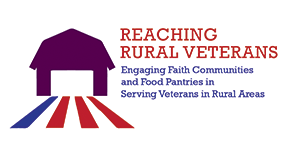Reaching Rural Veterans extends aid through food banks
Reaching Rural Veterans extends aid through food banks

Published on Jun. 10, 2016
Food banks in five Kentucky counties are conducting outreach programs and targeting services to veterans.
Anderson, Clay, Hardin, Madison, and Shelby counties are all home to food banks that received grant funds through Reaching Rural Veterans, the University of Kentucky and Purdue University program funded by the Veterans Affairs Administration and administered by the Military Family Research Institute at Purdue. The program aims to increase veterans' access to needed resources, including food and clothing.
UK’s involvement in this project is coordinated through the Family and Consumer Sciences Extension in the College of Agriculture, Food and Environment. Tyrone Atkinson, coordinator for Military Family Programs, provided leadership for the grant award process and continues to support the monthly programs conducted at the participating food pantries.
“In the early stages, I conducted training at these sites to insure that staff and volunteers were familiar with military culture and the unique issues facing veterans," Atkinson shared. "It’s been rewarding for me to watch as each of these food pantries held monthly events for veterans, providing food and other needed items and connecting veterans to service agencies in each local community.”
In addition to insuring the veterans are receiving food assistance, the program has provided monthly educational programs along with opportunities for consultation with local resource agencies. At the local level, agents and paraprofessionals from the county Extension offices have engaged in the project, providing nutrition education each month.
For the food banks, this grant project has provided a unique opportunity to meet the needs of a targeted audience and give back to those who have served our country. Cheri Montgomery, with Open Hands Food Pantry in Anderson County, said that "because of the work we’re doing as a community, we have helped many veterans and their families. I have seen veterans get connected to other community resources including the health department services, building a ramp for a disabled veteran, and supplying a washer and dryer to a family. The means are not always coming through our pantry, but because of the connectedness of the community we have been able to see needs being met."
Since the program was initiated in October, more than 2,500 veterans and their family members have been impacted. A grant proposal has been submitted to potentially continue the program for a second year.
Extension Family Consumer Sciences


